|
|
|
Sort Order |
|
|
|
Items / Page
|
|
|
|
|
|
|
| Srl | Item |
| 1 |
ID:
177581
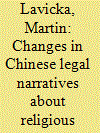

|
|
|
|
|
| Summary/Abstract |
Policies introduced by the Chinese government in the name of fighting terrorism, religious extremism and separatism have significantly reshaped the Xinjiang Uyghur Autonomous Region (XUAR) – even though securitization has not brought the ‘stability’ that the PRC government claims in its continuous defense of its policies. Analysis of Chinese legal documents can provide a clearer picture of the government’s intentions in the region, since they are almost free from the propaganda ballast abundant in Chinese policy documents. This article analyses recent amendments to two legal documents, the Religious Affairs Regulations and the Regulations of Xinjiang Uyghur Autonomous Region on Religious Affairs. It discusses why certain articles were omitted, modified or added and what this can tell us about the situation in China and in particular in Xinjiang. It also suggests that Xinjiang has been a testing site for national religious policy, not just new surveillance methods.
|
|
|
|
|
|
|
|
|
|
|
|
|
|
|
|
| 2 |
ID:
177583
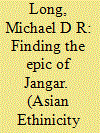

|
|
|
|
|
| Summary/Abstract |
During the early reform period in China beginning in 1978, intellectuals and government agencies expended significant resources collecting, ‘revising’, and publishing folk literature in collaboration with local folk artists and amateur collectors. While folk artists were encouraged to re-engage with past folk practices, academics were required to analyze and preserve this ‘folk culture’ ‘scientifically’, ‘objectively’, and ‘correctly’. This paper utilizes oral narratives of surviving agents and related materials to follow the politicized process of collection, ‘revision’, and publication of what would be called the ‘Epic of Jangar’ of Xinjiang’s Oirat Mongols. Through this process, a unified narrative began to emerge that assisted in the construction of a unique ‘excellent’ Mongol – but above all Chinese-Mongol – culture. Through textualization, historical ritualized socializing performances were systematically decontextualized and simultaneously recontextualized as a great contribution to Chinese national literature.
|
|
|
|
|
|
|
|
|
|
|
|
|
|
|
|
| 3 |
ID:
177587
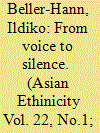

|
|
|
|
|
| Summary/Abstract |
Based on a close reading of three narratives, the article explores subtle shifts in the textual strategies employed by Uyghur intellectuals in Xinjiang in conveying identity discourses in different phases of the reform era. Although it is tempting to view these texts in terms of resistance, they are better approached as sites of accommodation, motivated by the wish to bolster a sense of Uyghur belonging without jeopardizing individual and communal self-preservation. Increasing political pressure on indigenous knowledge production culminated in 2016 in brutal silencing. Shifting textual strategies in the preceding decades demonstrate how native narratives creatively shaped and redefined representations of the ‘Uyghur’ as an ethnic group in constant dialogical negotiation with the changing socio-political context; the texts can thus be read as sensitive barometers of policy changes.
|
|
|
|
|
|
|
|
|
|
|
|
|
|
|
|
| 4 |
ID:
177584
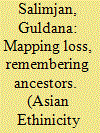

|
|
|
|
|
| Summary/Abstract |
Genealogical narratives are important aspects of Kazakh social life in China and the formation of self-identifications. They reflect tensions in competing forms of history-writing through which the Chinese state maintains control over its frontier. Through ethnography and critical analysis of locally produced and circulated genealogy books, this article traces the connections between genealogy as a way of knowing and its creative agency under the Chinese settler order in the Xinjiang Uyghur Autonomous Region. The article argues that Kazakh genealogy books as knowledge production are a response to Mao era assimilationist policies and reform era economic dispossession. Genealogy in this context mediates and mobilizes local histories, land epistemology, and gender ideals to construct Kazakh collective memory and belonging to ancestral places in northern Xinjiang.
|
|
|
|
|
|
|
|
|
|
|
|
|
|
|
|
| 5 |
ID:
177578


|
|
|
|
|
| Summary/Abstract |
This article focuses on mythico-historical texts belonging to the Chingiznāma-Oghuznāma Complex, an oral and written tradition that emerged over the course of seven centuries in post-Mongol Central Asia and the Middle East. It disentangles the narrative strategies creatively employed by authors and tradents who deconstructed and re-constructed narratives that blend the genealogy of Chingiz Khan with the epic story of Oghuz Qaghan, showing how they mobilized and developed the plots and motifs at their disposal to meet the political, ideological and communal requirements of their times. Focusing in particular on the changing ways in which the texts foreground particular mothers and the maternal line over nobility granted through paternal descent, the article highlights narrative traces of multiple religious beliefs and postulates – Jewish and Christian, as well as Inner Asian theistic and Islamic. It also demonstrates that some later texts refute claims to descent-based continuity in power and rule altogether.
|
|
|
|
|
|
|
|
|
|
|
|
|
|
|
|
| 6 |
ID:
177586
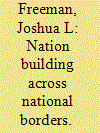

|
|
|
|
|
| Summary/Abstract |
The process of nation building often entails the articulation of communal heroes. This paper argues that the elevation of such heroes is particularly significant for minority nations divided between multiple states. The project of building the Uyghur nation, carried out across the borders of three twentieth-century socialist states, offers a unique opportunity for examining this phenomenon. In particular, the Uyghur case offers insight into the many minority communities whose nation building process was linked to twentieth-century socialism. This paper traces the posthumous reputation of Sadir Palwan, a nineteenth-century resistance fighter against the Qing empire who in the twentieth century was reinterpreted as a Uyghur national hero. Drawing on poetry, fiction, journal articles, and textbooks, the paper demonstrates that the project of articulating a heroic canon allowed Uyghur intellectuals to work across state borders as they shaped an identity for their nation outside the nation-state framework.
|
|
|
|
|
|
|
|
|
|
|
|
|
|
|
|
| 7 |
ID:
177579


|
|
|
|
|
| Summary/Abstract |
The era spanning the late Qing and early Republic of China (1877–1933) is regarded as a period of extensive change in East Turkestan (Xinjiang), Chinese Central Asia, particularly with regard to the emergence of modern Uyghur national identity, and therefore of ethnonational conflict. However, the tendency to focus on ethnic identity obscures other dimensions of conflict, among them the tensions that emerge during periods of rapid economic change. This article shows how violence in the oasis of Kucha in 1918 stemmed from conflict between two competing groups of landowners. However, systems of information-gathering within the provincial government and the representation of the events to the outside world promoted the idea that this violence stemmed instead from ethnic or religious difference and international conspiracy. Those power-holders advanced representations of the society they governed that were useful to their politics and, in turn, to modern Chinese politics as well.
|
|
|
|
|
|
|
|
|
|
|
|
|
|
|
|
| 8 |
ID:
177582


|
|
|
|
|
| Summary/Abstract |
In China, ‘heritage’ as a terminological construction was shaped within specific discursive and organizational frames over the course of decades. As an outcome, UNESCO’s heritage discourse, universal by intention, was definitively redefined in China to adjust it to an ideology that would legitimize Chinese authorities’ cultural control over ethnic minorities. The heritagization of the genealogy writing tradition of the Chinese Sibe ethnic group as an integral part of this process, promotes the nation-building aspirations of powerholders. Taking the case study of an unpublished book as its starting point, this article examines the role performed by Sibe intellectuals in influencing how ‘common Sibe people’ think about their genealogy writing ‘heritage.’ It explores this process in its historicity with a focus on the textual strategies adopted by Sibe intellectuals who had to adjust to particular political and socio-cultural contexts.
|
|
|
|
|
|
|
|
|
|
|
|
|
|
|
|
| 9 |
ID:
177589
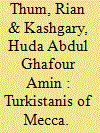

|
|
|
|
|
| Summary/Abstract |
This article presents a case study of one family’s exile from the Tarim Basin, where the relatives they left behind are now known as ‘Uyghurs,’ to the Mecca region, where the exiles regard themselves as ‘Turkistanis.’ This case is then examined in the context of other exilic families’ oral histories and narrative strategies to show an ongoing process of Turkistani identity formation and history production that seeks to accommodate personal and community histories of varied vintages and origins. Localized histories of early exiles mix with nationalist histories brought by later arrivals; family documents rub elbows with a hagiographical novel; and Turkistanis who see their community as unitary confront more recent ideas that some families are ‘Uyghurs’ and some are ‘Uzbeks.’ Together these form an eclectic whole that addresses the unusual position of a people who have been exiled from a place that much of the world views as a periphery to one that they themselves view as center.
|
|
|
|
|
|
|
|
|
|
|
|
|
|
|
|
| 10 |
ID:
177588


|
|
|
|
|
| Summary/Abstract |
This article traces the development of the modern concept of ‘Uyghur customs’ in Xinjiang, its rise to popularity in the 1980s-2010s and its demise after 2016. It argues that a certain modern notion of customs took shape in Xinjiang within the frame of modernization policies and the strengthening of formal bureaucracy. This notion, built on ideas introduced in the early twentieth century, defined customs as being distinct from politics, religion and economy. It provided Uyghur intellectuals with a politically safe space to write about local practices and construct Uyghur identity. These intellectuals were bridge builders between modern Chinese society and Uyghur communities. They used discourses around customs formulated in articles, books, TV-shows and teaching to envision a specifically Uyghur modernity. This cultural production ended abruptly with the detention of many of its protagonists and a general security clampdown on minority people and culture in Xinjiang from 2017.
|
|
|
|
|
|
|
|
|
|
|
|
|
|
|
|
| 11 |
ID:
177580
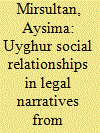

|
|
|
|
|
| Summary/Abstract |
Based on a close reading of five legal documents from Kucha, this paper explores judicial practice in Xinjiang in the Republican era. The documents all relate to members of the same family and open a window on to property transactions, family structure and local political administration at the lowest levels of government, across a long enough period to show change over time. Touching upon diverse social practices such as inheritance, the sale of land and making a pledge, the documents demonstrate the mutual integration of Islamic and state law, simultaneously revealing strategies to narrate and constitute social relationships.
|
|
|
|
|
|
|
|
|
|
|
|
|
|
|
|
| 12 |
ID:
177585
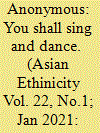

|
|
|
|
|
| Summary/Abstract |
This article examines the politics of China’s Intangible Cultural Heritage (ICH) policy and practice in Xinjiang through a study of the profound transformation of three interlinked Uyghur oral traditions ostensibly safeguarded as UNESCO or national-level cultural heritages: muqam, mäshräp and dastan. Based on fieldwork in Xinjiang and among the Uyghur diaspora, it shows how an intensive process of social reengineering, taking place in the nexus of contested state ICH policies and its ‘War on Terror,’ has transformed complex religio-cultural traditions into simplified and exoticized patriotic ‘song and dance’ performances. While the state defines these staged versions as ‘authentic’ heritage that should not be deviated from, community elders and cultural practitioners see them as ‘fake’; they violate community values and disembed fluid oral traditions from everyday life, which is where they are reproduced and generationally transmitted. The rhetoric of ‘safeguarding’ thus represents a disavowal of its actual effects and the severe restrictions on spaces available for cultural practice in Xinjiang.
|
|
|
|
|
|
|
|
|
|
|
|
|
|
|
|
|
|
|
|
|